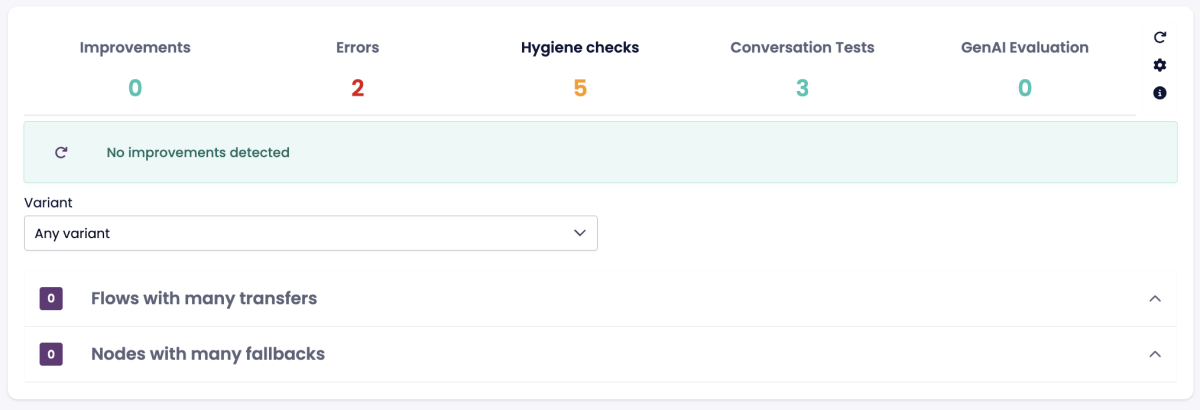Health
Overview
The Health section in BotStudio helps monitor the chatbot’s performance, detect errors, and suggest improvements. Regularly reviewing this section ensures the chatbot functions optimally and maintains high-quality user interactions.
The Health section is located in the Analyze & Debug section of the main navigation in BotStudio.
Health Features
The Health section provides five key types of checks:
- Improvements – Recommendations for enhancing chatbot performance.
- Errors – Identifies and highlights potential issues that could affect chatbot functionality.
- Hygiene Checks – Ensures chatbot flows and configurations are optimized.
- Conversation Tests – Validates chatbot responses to ensure consistency.
- GenAI Evaluation – Evaluates AI-generated responses to fine-tune accuracy.
Health Page Controls
At the top right of the Health page, you will find three key buttons:
- Recompute Checks – Refreshes all health assessments.
- Edit Health Settings – Adjusts thresholds for various checks (e.g., number of draft responses allowed).
- View Health Descriptions – Provides details on what each health check entails.
If the chatbot has multiple variants or supports different languages, a selection menu allows switching between them for targeted analysis.
Diagnostics
The Diagnostics bar displays system-wide issues affecting the chatbot. Depending on the selected tab, this bar provides an overview of key findings.
- Green Bar: No detected errors.
- Red Bar: Indicates errors that need attention, such as syntax issues or misconfigured authentication.
Common Issues Detected:
- Identically named nodes.
- BotScript syntax errors.
- Nodes requiring authentication when global authentication is disabled.
- Missing fallback for authentication failures.
- Compilation errors preventing chatbot deployment.
Screenshot Placeholder: Insert an image of a Diagnostics bar with error details.
Improvements
The Improvements tab highlights areas for chatbot optimization. This includes:
- Flows with Many Transfers – Identifies frequent chatbot-to-agent handovers and suggests improvements.
- Nodes with Many Fallbacks – Detects nodes where the chatbot frequently fails to understand user input, suggesting enhancements to matching rules and intent classification.
- Explore Feature – Groups common words into topics, providing insights into new potential chatbot flows.
Screenshot Placeholder: Insert an image of the Improvements tab with sample suggestions.
Errors
The Errors tab lists critical issues that can affect chatbot performance. These include:
- Syntax errors preventing deployment.
- Misconfigured nodes.
- Authentication-related failures.
Errors are categorized based on their severity. Some may prevent the chatbot from functioning, while others may cause minor inconsistencies.
Screenshot Placeholder: Insert an image showing an example error message with troubleshooting details.
Hygiene Checks
Hygiene checks provide recommendations for keeping the chatbot clean and efficient. This includes:
- Ensuring all classifiers are recently trained.
- Checking for redundant or outdated nodes.
- Identifying broken links within chatbot flows.
Unnecessary checks can be disabled if they are not relevant to the chatbot.
Screenshot Placeholder: Insert an image of the Hygiene Checks section with examples.
Conversation Tests
Conversation tests allow chatbot administrators to validate the chatbot’s responses using pre-recorded interactions. These tests help ensure that chatbot behavior remains consistent after updates.
Two Types of Tests:
- Test Path – Verifies that the chatbot follows the same node sequence in repeated interactions.
- Test Content – Ensures chatbot responses remain identical when given the same input.
Running a Conversation Test:
- Engage in a test conversation with the chatbot.
- Verify that responses are as expected.
- Click Use This Conversation as a Test Case.
- Assign a test name and specify whether to test the path, content, or both.
- Save and run tests whenever chatbot updates occur.
Screenshot Placeholder: Insert an image showing the Conversation Tests section with test creation steps.
Updating Conversation Tests
If chatbot responses change over time, existing tests may need updates. If a test fails, administrators can either:
- Adjust chatbot responses to align with the expected outcome.
- Update the test case to reflect the chatbot’s latest response behavior.
Screenshot Placeholder: Insert an image showing a failed conversation test with an update option.
GenAI Evaluation
The GenAI Evaluation feature helps assess chatbot-generated responses using AI models. This tool is crucial for refining chatbot accuracy and optimizing response quality.
Key Features:
- Generated Reply Quality – Evaluates response correctness based on set thresholds.
- Articles Presented – Analyzes the quality of suggested content based on user queries.
- Threshold Adjustments – Fine-tunes AI model performance for optimal results.
Running a GenAI Evaluation:
- Activate Generative AI API in the demo panel.
- Enter a test message and add it to Generative AI Tests.
- View evaluation results on the GenAI Evaluation page.
Screenshot Placeholder: Insert an image of the GenAI Evaluation interface with test results.
Adjusting Thresholds
Thresholds determine whether chatbot responses are classified as:
- Good – High confidence and accurate response.
- Acceptable – Somewhat relevant but could be improved.
- Unacceptable – Poor response requiring adjustment.
- No Reply Sent – Below threshold and not displayed to the user.
Administrators can experiment with threshold values to optimize chatbot performance.
Screenshot Placeholder: Insert an image of Threshold settings in GenAI Evaluation.
Best Practices for Maintaining Chatbot Health
- Regularly recompute health checks to catch new issues early.
- Use conversation tests to validate chatbot performance after updates.
- Monitor error logs to prevent disruptions.
- Fine-tune AI thresholds to balance accuracy and relevance.
- Review hygiene checks periodically to maintain an optimized chatbot structure.


